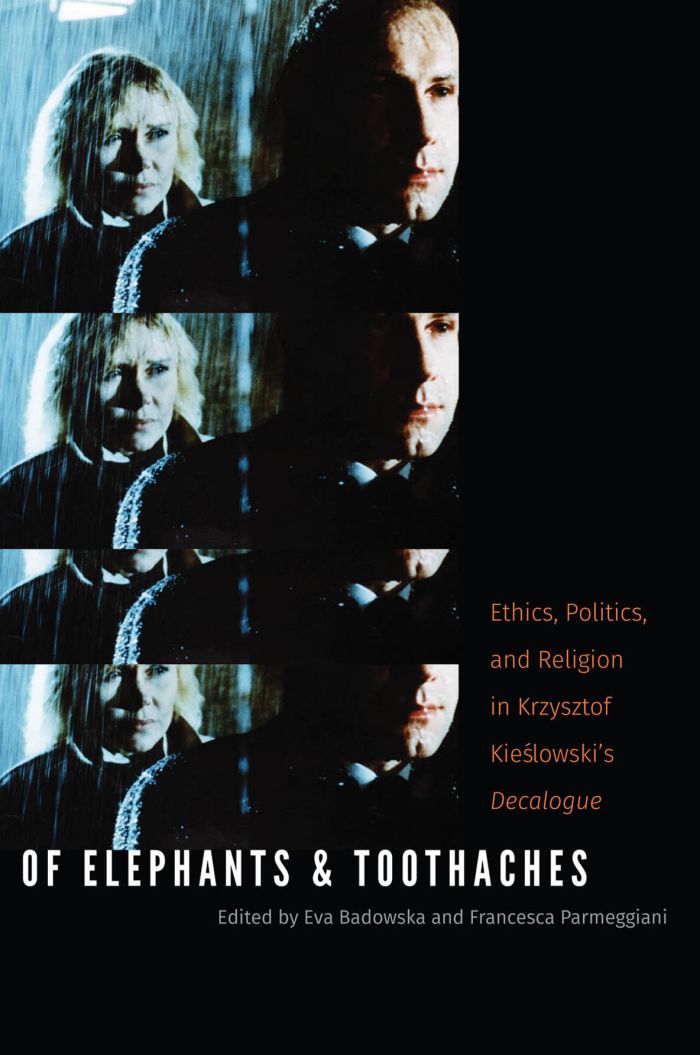Of Elephants and Toothaches
Ethics, Politics, and Religion in Krzysztof Kieslowski's 'Decalogue'

This book can be opened with

This collection is the first to offer a genuinely interdisciplinary approach to Krzysztof Kieślowski’s Decalogue, a ten-film cycle of modern tales that touch on the ethical dilemmas of the Ten Commandments. The cycle’s deft handling of moral ambiguity and inventive technique established Kieślowski as a major international director.
Kieślowski once said, “Both the deep believer and the habitual skeptic experience toothaches in exactly the same way.” Of Elephants and Toothaches takes seriously the range of thought, from theological to skeptical, condensed in the cycle’s quite human tales. Bringing together scholars of film, philosophy, literature, and several religions, the volume ranges from individual responsibility, to religion in modernity, to familial bonds, to human desire and material greed. It explores Kieślowski’s cycle as it relentlessly solicits an ethical response that stimulates both inner disquiet and interpersonal dialogue.
This volume is true to the spirit of open engagement in relation to matters of ultimate concern. In their introduction, the editors cite a quote from Kieslowski that wonderfully expresses this openness: 'Both the deep believer and the habitual skeptic experience toothaches in exactly the same way. I always try to speak about toothaches--always. If I am successful in talking about toothaches, I think everyone will understand me.' Indeed, this collection as a whole speaks to this experience of 'toothaches' that afflicts us all. Like Kieslowski himself, the various contributors of this collection are willing to grope in the dark as they explore some of the most fundamental but uncharted facets of the human condition.——John Caruana, Ryerson University
“This is a strong and timely collection that fills a gap in the existing English-language scholarship on a very significant work, and the important issues it raises.”——Paul Coates, University of Western Ontario
...a buffet of stimulating—yet nourishing—dishes on Kieslowski’s masterwork.—Historical Journal of Film, Radio and Television
Eva Badowska is Associate Professor of English and Comparative Literature at Fordham University. Her publications include articles on Victorian fiction (in PMLA and Victorian Literature and Culture), feminist theory (in Tulsa Studies in Women’s Literature), psychoanalytic theory (in The Psychoanalytic Review) and Polish poetry (in Parnassus: Poetry in Review). She is now working on a book entitled Kieslowski in Theory and History.
Francesca Parmeggiani (Author)
Francesca Parmeggiani is Associate Professor of Italian and Comparative Literature at Fordham University. Her research focuses on contemporary Italy, women’s writing, and cinema. She is the author of Lo spessore della letteratura (Longo, 2007), a study of the fictional adaptations of scripture by Italian writers in the 1960s and 1970s, and the co-editor of Forme, volti e linguaggi della violenza nella cultura italiana (Edibom, 2012), an essay collection on the representation of violence in Italian culture. Her articles have appeared in Annali d’Italianistica, Cahiers d’études italiennes, Italica, Italianistica, and Romance Languages, among other venues.
Please click the link below to download the Open Access version of this book.
- Of Elephants and Toothaches - epub

